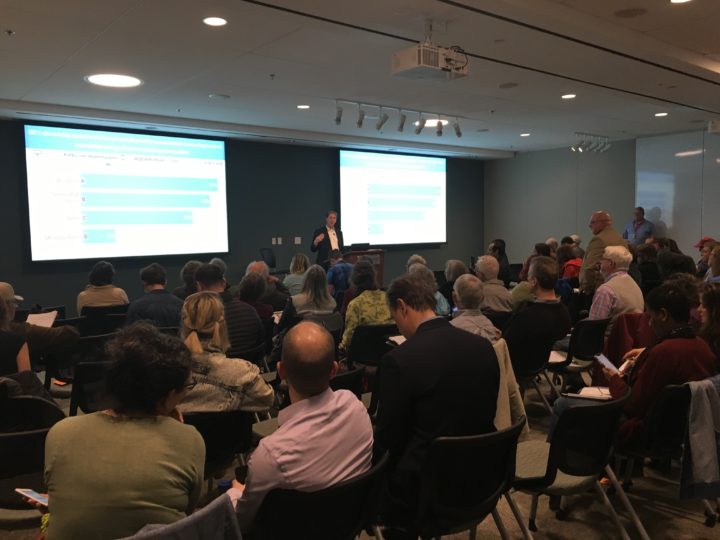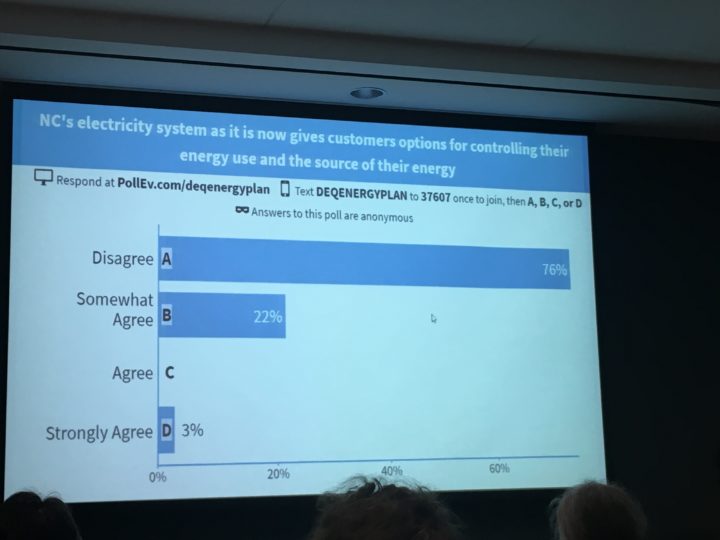This blog was written by Jennifer Rennicks, former Senior Director of Policy & Communications at the Southern Alliance for Clean Energy.
Guest Blog | March 20, 2019 | Energy Efficiency, Energy Policy, North Carolina Workshops and listening sessions are in full swing around the Old North State as state agencies solicit input and feedback from a wide range of stakeholders in an effort to turn a brief executive order into a robust clean energy plan for North Carolina.
Workshops and listening sessions are in full swing around the Old North State as state agencies solicit input and feedback from a wide range of stakeholders in an effort to turn a brief executive order into a robust clean energy plan for North Carolina.
Late last year, North Carolina’s Governor Roy Cooper issued Executive Order 80 affirming a commitment to address climate change and transition to a clean energy economy by striving to meet these three goals by 2025:
- Reduce statewide greenhouse gas emissions to 40% below 2005 levels
- Increase the number of registered, zero-emission vehicles (ZEVs) in the state to at least 80,000 (in 2018 there were just under 9,000 EVs or plug-in hybrids registered in NC)
- Reduce energy consumption per square foot in state-owned buildings by at least 40% from fiscal year 2002-2003 levels
Once finalized and adopted, this clean energy plan will provide North Carolina with a roadmap to fulfill global pollution reduction goals outlined in the 2015 Paris (Climate) Agreement, as well as boost the state’s commitment to developing clean energy and jobs. It’s worth noting that recent reports from the Southern Alliance for Clean Energy illustrate North Carolina’s leadership in deploying utility-scale solar energy as well as energy efficiency reductions and the potential that exists for further gains in both areas.
Cooper’s executive order also calls for the creation of a ZEV plan, a motor fleet ZEV plan, and other actions. It is an ambitious goal turn an executive order with scant details into a robust clean energy plan in less than a year, as the current timeline aims to have a plan on the governor’s desk by October 2019, hence an expedited schedule of public sessions and workshops.
I attended one of the earliest scheduled listening sessions in a packed audience in Asheville, NC on March 14. Other public listening sessions are scheduled throughout the spring in Rocky Mount, Fayetteville, Wilmington, Hickory, Elizabeth City, Charlotte and Greensboro as well as a series of technical, facilitated workshops which will be held in Raleigh through mid summer. More information about both the listening sessions and workshops can be found here. Another way for the public to learn more or provide input for the energy plan is to submit comments online here through July 31st.
After viewing brief expert presentations taped at the first workshop on our current energy mix and capacity as well as emission trends, all attendees were invited to provide input on our current electricity system and key values through a variety of methods including comment cards, short comments via a microphone, and live polling using mobile phones, as illustrated in the image below:
This executive order is a huge step in the right direction and will help North Carolinians reap the benefits of the clean energy economy of the 21st century. SACE will continue to support efforts that help the Old North State meet these goals and we encourage all North Carolinians to weigh in online or in person on the development of the Old North State’s first comprehensive energy plan.